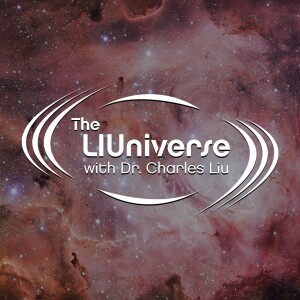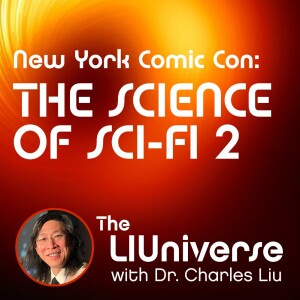
The LIUniverse with Dr. Charles Liu
Science:Astronomy

Are we all mutants? Can we all be superheroes? Is the multiverse all in our heads?
Welcome to Season 2 of The LIUniverse with Dr. Charles Liu. We’re kicking off this season the same way we did last season, with “The Science of Science Fiction” – our latest standing-room-only panel from the most recent New York Comic Con. Chuck’s guests this time around were neuroscientist and clinical psychologist Dr. Heather Berlin and geneticist Dr. Dan Ginsburg. Join us as we delve into the science surrounding three subjects: Super Genetics, Super Neuropsychology, and the Multiverse.
Segment 1: Super Genetics
Dan explains how in reality, we’re all mutants, with changes in our DNA occurring naturally in our lives. Could Horizontal Gene Transfer account for Jennifer Walters turning into She-Hulk after a transfusion from her cousin Bruce Banner, aka, the Hulk! Could a radioactive spider actually turn Peter Parker into a super-hero? After all, about 1500 genes in the human genome actually came from other species. And what about super-powered mutations due to exposure to various forms of radiation?
Find out why immortality isn’t a cure for psychosis, and why the human brain’s imperfection and constant state of change mean that the longer you live, the less like your earlier self you remain. And what would an immortal remember? According to Dr. Berlin, not nearly as much as consciously as subconsciously, and limited by the size of the hippocampus.
Heather tells us about her work on the National Academy of Sciences Science and Entertainment Exchange, where real scientists work with content creators from Hollywood to the hinterlands to inject real science into fictional worlds. (They’re even on call at 1-800-NEEDSCI!) Remember when Dr. Strange gets distracted while driving and gets into the car wreck that starts off his whole MCU journey? That was Heather!
Segment 2: Super Neuropsychology
Turning to Moon Knight, we explore the neural and psychoanalytic aspects of dissociative identity disorder (DID). Could one state of consciousness have different physical attributes or skills than another, the way Jake Lockley can speak Spanish and Stephen Grant can speak Arabic but Marc Spector, Moon Knight’s main persona, can’t really speak either? Heather talks about the actual data that proved that one person could be blind in one state of consciousness, and not the other. Dan and Heather discuss external stressors and genetic predispositions to DID and also whether different personas can interact with each other.
After that, Charles crosses from Marvel into DC to discuss Neil Gaiman’s Sandman, and how during Morpheus’ absence, people fell into a long-term, dreamless state of sleeping stupor called Encephalitis Lethargica. It turns out, it’s a real thing, and up to a million people or even more may have suffered from encephalitis lethargica for which the Spanish Flu virus may have been the triggering event. Could “long COVID” create similar responses, especially given all the mutations the COVID virus keeps generating at a more rapid rate than human biology can adapt to. And what does the immuno histocompatibility complex have to do with any of this?
Next, you’ll hear a spoiler-free discussion of the Scarlet Witch explores whether grief or other forms of emotion cause serious psychological issues? Can they cause mutation?
Of course, this wouldn’t be The LIUniverse without Chuck taking questions from our audience. Via email, Talal asks about time perception in brains, and does brain size impact our sense of time, as in when Ant-Man or the Wasp shrink to the size of an insect. Heather explains how brain size has no impact, but how a brain, human or otherwise, is wired does speed up or slow down our perception of the passage of time.
Segment 3: The Multiverse
It’s all the rage right now, especially thanks to “Dr. Strange in the Multiverse of Madness,” “Spider-Man: No Way Home,” and more, but what exactly is the current state of scientific thought around it? Astrophysicist Chuck gives us the 411 on the multiverse – why it could actually exist, with us within it, but why traveling between the universes within the multiverse like America Chavez does is still very much the realm of science fiction. To which Heather reframes the question, looking at the idea that our brain creates our subjective reality, and we can create multiple universes in our heads. (Shoutout to Michelle Yeoh and “Everything Everywhere, All at Once”!)
Our last questions come from Dr. Berlin, who asks Chuck about a version of the Drake equation for multiverses, quantum entanglement, spooky action at a distance, and how they all relate to the ideas about the multiverse; and Dr. Ginsburg, who asks about 5-dimensional constructs called membranes (M theory) and the many worlds hypothesis.
Finally, because there’s one in “the Multiverse of Madness,” we turn to the ever-popular concept of zombies. Dan tells us about infectious zombies, including how a fungus can take over its prey the way cordyceps can infect ants. Unfortunately, Heather tells us, humans are not immune, and brings up the effects of toxoplasmosis and also compares sleepwalkers with zombies.
Best panel ever? Watch and decide for yourself.
All characters and comic properties are the copyright of their respective owners.
We hope you enjoy the Season 2 premier of The LIUniverse, and, if you do, please support us on Patreon.
More Episodes
 2024-11-09
2024-11-09
 2.0k
2.0k
 2024-10-26
2024-10-26
 2.1k
2.1k
 2024-10-19
2024-10-19
 2.4k
2.4k
 2024-09-07
2024-09-07
 3.3k
3.3k
 2024-08-24
2024-08-24
 3.7k
3.7k
 2024-08-10
2024-08-10
 2.6k
2.6k
 2024-07-20
2024-07-20
 2.6k
2.6k
 2024-07-06
2024-07-06
 2.9k
2.9k
 2024-05-18
2024-05-18
 3.9k
3.9k
 2024-05-04
2024-05-04
 3.7k
3.7k
 2024-04-20
2024-04-20
 4.2k
4.2k
 2024-04-04
2024-04-04
 4.0k
4.0k
 2024-03-30
2024-03-30
 4.4k
4.4k
 2024-03-16
2024-03-16
 4.3k
4.3k
 2024-03-03
2024-03-03
 3.3k
3.3k
 2024-02-17
2024-02-17
 4.3k
4.3k
 2023-12-30
2023-12-30
 5.3k
5.3k
Create your
podcast in
minutes
- Full-featured podcast site
- Unlimited storage and bandwidth
- Comprehensive podcast stats
- Distribute to Apple Podcasts, Spotify, and more
- Make money with your podcast
It is Free
- Privacy Policy
- Cookie Policy
- Terms of Use
- Consent Preferences
- Copyright © 2015-2024 Podbean.com





